Dorian Jones
November 29, 2012
A worker walks past the pumping station on the border between Iran and Turkey during the inauguration ceremony for the Iran – Turkey gas pipeline, January 22, 2002.
ISTANBUL — Turkey late least week acknowledged that a surge in its gold exports this year is related to payments for imports of Iranian natural gas, shedding light on Ankara’s role in breaching U.S.-led sanctions against Tehran.
In response, U.S. senators said they will seek to close this loophole. But a Turkish trade minister has warned Turkey will not respect any new U.S. measures.
Turkish Deputy Prime Minister Ali Babacan admitted Turkey was paying for its gas imports with gold. While Washington has warned it is considering new measures to prevent such payments, Turkey’s economy minister Zafer Çaglayan this week dismissed the threat.
“The U.S. sanctions stand for the U.S.,” Çaglayan said. “We have multilateral international agreements. These deals we are a party to and are binding for us. But measures taken by the EU are also not binding since we are not a member,” he said.
Iran is Turkey’s second largest supplier of gas after Russia, with more than 90 percent of Iran’s gas exports going to Turkey.
Iran provides 18 percent of Turkey’s natural gas and 51 percent of its oil. But since U.S. and European Union sanctions ban Tehran from receiving payments in dollars or euros, Ankara pays Iran for the gas in Turkish liras. The lira is of limited value for buying goods on international markets but ideal for purchasing Turkish gold. The government has not specified how it pays for Iranian oil.
Iranian analyst Jamshid Assadi, of France’s Burgundy Business School, says the arrangement works for both countries.
“Iran has difficulties to get paid, because the financial and banking transactions are so big they cannot do that. Oil and gas and sometimes the electricity they sell to Turkey, in return they get gold. This is a big source of income for Turkey and this is a solution for the trouble in Iran,” he said.
Since the start of the year, Turkish exports of gold to Iran have rocketed. According to official Turkish trade data, nearly $2 billion in gold was sent to Dubai in August on behalf of Iranian buyers.
But chief economist for Finansbank Inan Demir says that amount is not surprising.
“I think everyone knows that if you are allowed to purchase some oil from Iran, then you are going to have to pay as well, and that payment method seems to be gold. But I am sure Turkey is not the only country where these operations are being carried out. If I am not mistaken, India is carrying out transactions,” he said.
Analysts say despite growing international sanctions against Tehran, Ankara is reluctant to cut off its Iranian energy imports completely, as that would make it totally dependent on Moscow for its gas supplies.
Ties between Tehran and Ankara have become increasingly complicated in the past two years, as the Arab uprisings have polarized foreign policy goals. The countries split most recently over the Syrian conflict, where Iran supports President Bashar al-Assad, while Turkey backs rebels seeking to oust the regime in Damascus.
Suat Kiniklioglu, a former member of parliament’s foreign affairs committee for the ruling AK party, says trade relations could start to drop off.
“There are already differences over Syria with Iran and that is ongoing. I think you will see less trade, less political dialogue and less deepened dialogue with Iran,” he said.
Analysts say Ankara is believed to be looking for alternative energy suppliers to Iran, which would be favored by both Brussels and Washington as they seek to increase the pressure on the Iranian regime. But changing energy suppliers does take time, so it seems likely that gold will, for some time, continue to head to Tehran.
via Turkey Continues Trading Gold for Iranian Natural Gas.




